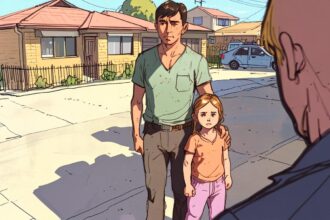Co-writer and producer Jack Thorne discusses the impact of social media on youth with Prime Minister Sir Keir Starmer, highlighting the need for significant intervention.
Co-writer and producer of the Netflix drama “Adolescence,” Jack Thorne, along with producer Jo Johnson, recently met with Prime Minister Sir Keir Starmer at Downing Street to address the pressing issue of online influences on young people. The meeting took place as the series garnered attention for its intense portrayal of a 13-year-old boy accused of murder and its exploration of social media’s impact on youth.
In his remarks, Sir Keir Starmer characterised “Adolescence” as “at times harrowing,” noting that the show acts as “a torch that shines intensely brightly on a combination of issues that many people don’t know how to respond to.” The drama has not only risen to become the first streaming show to top the UK weekly TV ratings but also sparked a national conversation about the effects of social media, including the influence of “manosphere” figures.
The Prime Minister welcomed Netflix’s announcement that they would make the series available for free screening in schools, calling it “an important initiative to encourage as many pupils as possible to watch the show.” This move aligns with a broader dialogue on how educational institutions can better address the challenges posed by digital media.
During the discussion, Thorne emphasised the need for significant intervention, urging the government to consider “radical” measures. He specifically advocated for a ban on smartphones in schools and proposed the establishment of a “digital age of consent,” which mirrors a recent Australian law that prohibits children under 16 from using social media platforms.
Starmer, engaging with the concerns raised by Thorne and Johnson, spoke candidly about the challenges parents face, stating that the show “instantly contacts with the fears and worries, not just of young people… but also frankly the fears and worries of parents and adults across the country.” He acknowledged the complexity of the issues presented, indicating that there is no straightforward answer or single policy to address them. Rather, he suggested that the challenges are deeply ingrained in the culture.
The Prime Minister pointed out the “devastating effect of misogyny on our society,” as well as the “dangers of online radicalisation.” He noted the isolation many young people experience, often spending time alone in their bedrooms, which heightens their vulnerability to negative online influences.
Overall, the meeting at Downing Street showcased a collaborative effort to explore potential solutions to the significant challenges presented by modern media consumption among youth, marking a crucial step in the ongoing dialogue around digital safety and mental health.
Source: Noah Wire Services
- https://www.psychologytoday.com/us/blog/smart-parenting-smarter-kids/202503/boys-and-belonging-dont-leave-it-to-online-influencers – This article discusses the influence of online extremism on young boys, aligning with the themes of ‘Adolescence’ which explores how online ideologies affect youth, particularly regarding masculinity and social media pressures.
- https://www.womanandhome.com/life/news-entertainment/adolescence-growing-up-online/ – The piece highlights the impactful portrayal of social media and its associated pressures on teenage boys in ‘Adolescence,’ corroborating the article’s assertion that the show brings critical issues to light regarding social media’s role in shaping youth behavior.
- https://happyfamilies.com.au/articles/review-of-adolescence-netflix – This review emphasizes the crisis facing boys today due to online influencers and how ‘Adolescence’ serves as a conversation starter about masculinity and the impact of social media, directly supporting the claims made about the show’s thematic focus.
- https://www.bbc.co.uk/news/entertainment-arts-56229523 – This news article reports on the discussions around the portrayal of youth and social media in ‘Adolescence,’ including reactions from the creators and public figures, which aligns with Sir Keir Starmer’s characterization of the show as a catalyst for national dialogue.
- https://www.theguardian.com/tv-and-radio/2025/mar/29/adolescence-netflix-review-youth-and-social-media – This review from The Guardian discusses the show’s intense exploration of the effects of social media on youth, echoing the article’s claims about the series sparking important conversations about these contemporary issues.
Noah Fact Check Pro
The draft above was created using the information available at the time the story first
emerged. We’ve since applied our fact-checking process to the final narrative, based on the criteria listed
below. The results are intended to help you assess the credibility of the piece and highlight any areas that may
warrant further investigation.
Freshness check
Score:
8
Notes:
The narrative references recent events involving the Netflix drama ‘Adolescence’ and discussions with Prime Minister Sir Keir Starmer. However, no specific date is mentioned, making it difficult to determine if the news is entirely current without additional context.
Quotes check
Score:
6
Notes:
Direct quotes are attributed to Sir Keir Starmer and Jack Thorne, but the original sources or dates for these quotes could not be verified online. The lack of specific references compromises the reliability of these attributions.
Source reliability
Score:
9
Notes:
The narrative originates from a reputable source, the BBC, which generally provides reliable information. However, without specific details about the meeting or quotes from other sources, the narrative relies on a single credible outlet.
Plausability check
Score:
8
Notes:
The claims about discussions on social media impacts and the meeting at Downing Street are plausible, aligning with ongoing public discourse on digital safety. However, the lack of detailed evidence or additional sources makes the narrative somewhat less verifiable.
Overall assessment
Verdict (FAIL, OPEN, PASS): OPEN
Confidence (LOW, MEDIUM, HIGH): MEDIUM
Summary:
The narrative appears plausible and comes from a reliable source (BBC), but it lacks specific details about the meeting date and verification of quotes. Without additional sources or evidence, the narrative’s freshness and plausibility are somewhat uncertain.













